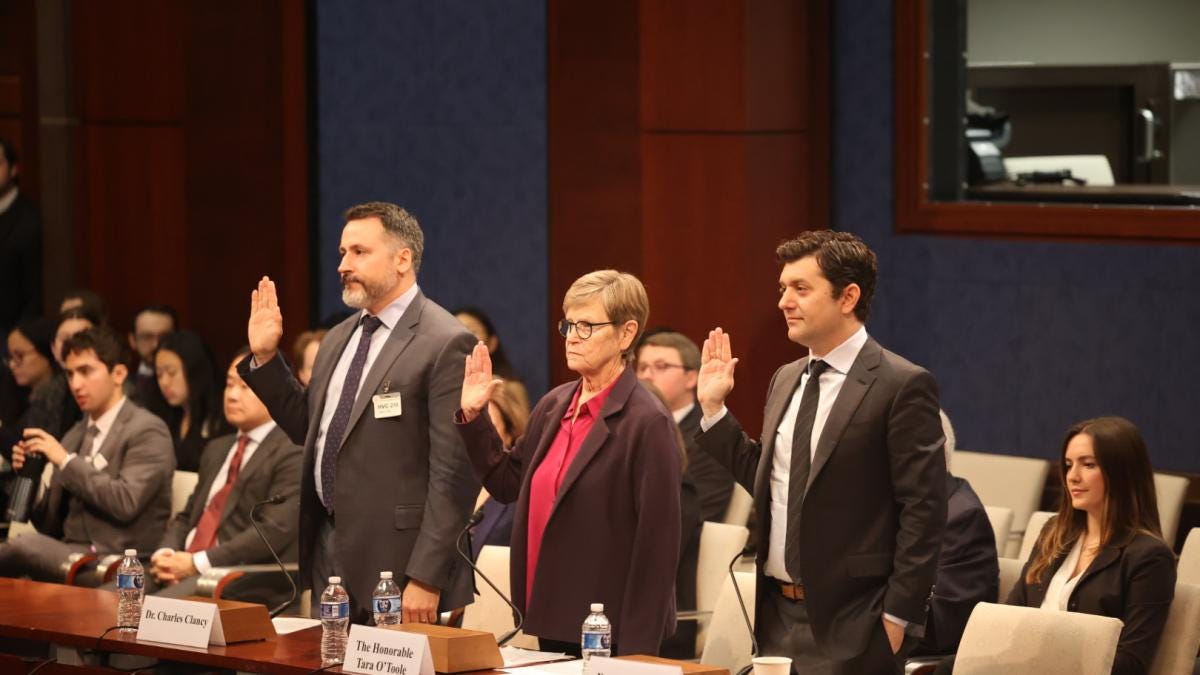NatSec & Biotech #5: U.S. politicians raise alarm on China biotech risks
“DNA collection, genetic surveillance, and genetically selective weapons”
Welcome to the NatSec & Biotech Update: a newsletter on the intersection of biotechnologies and international relations.
In this edition:
House CCP committee attacks China’s use of biotech
Visualized: CRISPR applications in agriculture and health
USA
House Committee attacks China’s use of biotech (Select Committee on the CCP)
The House Select Committee on the Chinese Community Party held a hearing titled “Growing Stakes: The Bioeconomy and American National Security.” Much of the discussions focused on criticism of China’s approach to biotech.
Committee Chairman Mike Gallagher (R-WI) warned: “We’ve already seen how China is going to use advanced biotechnology,” including forced DNA collection, genetic surveillance, and genetically selective weapons.
“The CCP is executing a plan to build a DNA database on every man, woman, and child on the planet,” he said. “The database includes Americans, whose DNA they’re collecting with large cyber hacks, corporate acquisitions, and other methods.”
“[The U.S.] needs to be there first [on biotech] so we can set the rules of the road,” Gallagher said, with appropriate ethical standards.
Ranking Committee Member Raja Krishnamoorthi (D-IL) said: “The competition with the CCP and biotech is make or break. Let’s keep outcompeting the CCP. That means we must not only invest in people but work in close collaboration with allies.”
Dr. Jason Kelly, CEO of Ginkgo Bioworks and chairman of Congress’s National Security Commission on Emerging Biotechnology (NSCEB), said: “Our inability to know the source of the [COVID-19] to me, is the largest intelligence failure since 9/11.”
Dr. Tara O’Toole, senior fellow at intelligence investor In-Q-Tel and former under secretary of homeland security for science and technology, said: “We have to assume that every Chinese company is linked to the CCP and possibly to the PLA if they’re doing research relevant to the military.”
Dr. Charles Clancy, chief technology officer at the MITRE research managing organization, said: “Security is a major concern. One way China likes to catch up is to cheat – stealing intellectual property – and the U.S. research security apparatus needs to be updated to reflect risks across all critical emerging technologies.”
BIO, the U.S. biotech trade association, said it supports the government’s national security goals. WuXi AppTec left the body.
“CRISPR gene editing applications are expanding dramatically in agriculture. Here are the latest advances” (GLP)
The article provides of an overview of recent applications of CRISPR gene editing in agriculture.
CRISPR technology has enabled agricultural advances, including slick-coat cattle, red sea bream that grows larger, tiger puffer with increased appetite, high-oleic soybean, tomato with increased gamma-aminobutyric acid (GABA), high-starch maize, and reduced browning banana.
CRISPR is also being used for new therapies to treat sickle cell disease (approved by US FDA in December 2023), beta-thalassemia, the degenerative disease transthyretin (TTR) amyloidosis, and congenital eye disease. Clinical trials are planned for both rare (progeria, severe combined immunodeficiency, familial hypercholesterolemia) and common (cancer, HIV infection) diseases.
In the decade ahead, genome editing will intersect with advances in other technologies, such as machine learning, live cell imaging, and sequencing. The authors conclude: “Just as during the advent of CRISPR genome editing, a combination of scientific curiosity and the desire to benefit society will drive the next decade of innovation in CRISPR technology.”




Re-China: The strong impression I get is that, as in most other spheres, the picture of it that Americans paint (cyber-DDR scale genetics databases and surveillance systems, covert ethnic bioweapons, etc.) - is much cooler than its banal realities.